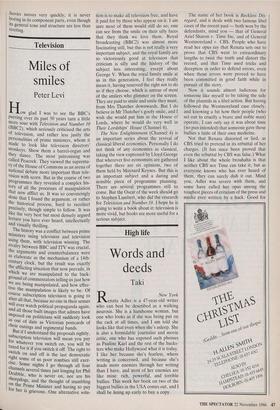Television
Miles of smiles
Peter Levi
ow glad I was to see the BBC's H purring over its past 50 years turn a little more sour with Television and Number 10 (BBC2), which seriously criticised the arts of television, and rather less justly the personalities of prime ministers, whom it made to look like television directors monkeys. Show them a barrel-organ and they dance. The most patronising was called Peacock. They viewed the suprema- cy of the House of Commons as an arena of national debate more important than tele- vision with scorn. But in the course of two programmes they revealed a complex his- tory of all the processes of manipulation that now afflict us. It was so convincingly done that I found the argument, or rather the historical process, hard to recollect precisely, though simple to follow. It was like the very best but most densely argued lecture you have ever heard, intellectually and visually thrilling. The history was a conflict between prime ministers using television and television using them, with television winning. The rivalry between BBC and ITV was crucial, the arguments and counterbalances were as elaborate as the mechanism of a 14th- century clock, but the result was exactly the afflicting situation that now prevails, in which we are manipulated to the back- ground of commentators telling us just how we are being manipulated, and how effec- tive the manipulation is likely to be. Of course subscription television is going to alter all that, because no one in their senses will ever watch political propaganda again, and all those built images that admen have imposed on politicians will suddenly look as out of date as Victorian postcards of choir outings and regimental bands. But if I understand the proposals rightly, subscription television will mean you pay for whatever you switch on, you will be taxed for it if you switch it off. The right to switch on and off is the last democratic right some of us poor zombies still exer- cise. Some nights I go through all four channels several times just longing for Phil Drabble, who is never on, nor are his sheepdogs, and the thought of stumbling on the Prime Minister and having to pay for her is grievous. • One alternative solu- tion is to make all television free, and have it paid for by those who appear on it. I am sure most of them would still do so; one can see from the smile on their silly faces that they think we love them. Royal broadcasting (BBC2) was almost more fascinating still, but this is not really a very important subject, and the royal family are so victoriously good at television that criticism is silly and the history of the subject less interesting, except about George V. When the royal family smile at us in this generation, I feel they really mean it, having reserved the right not to do so if they choose, which is untrue of most of the smilers who glimmer on the screen. They are paid to smile and smile they must, from Mrs Thatcher downwards. But I do believe in Mr Thatcher's goofy smile, and I wish she would put him in the House of Lords, where he would do very well in Their Lordships' House (Channel 4).
The New Enlightenment (Channel 4) is an important series about the revival of classical liberal economics. Personally I do not think of any economics as classical, taking the view expressed by Lloyd George that wherever five economists are gathered together there are six opinions, two of them held by Maynard Keynes. But this is an important subject and a daring and sensible piece of programme planning. There are several programmes still to come. But the Oscar of the week should go to Stephen Lambert, who did the research for Television and Number 10. I hope he is going to write a book about it: television is more vivid, but books are more useful for a serious subject.


























































 Previous page
Previous page